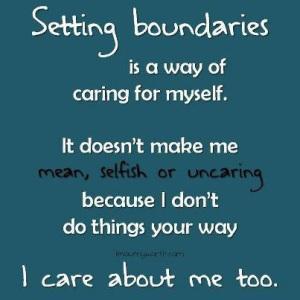 Setting clear personal boundaries is the key to ensuring relationships are mutually respectful, supportive and caring. Boundaries are a measure of self-esteem. They set the limits for acceptable behavior from those around you, determining whether they feel able to put you down, make fun, or take advantage of your good nature.
Setting clear personal boundaries is the key to ensuring relationships are mutually respectful, supportive and caring. Boundaries are a measure of self-esteem. They set the limits for acceptable behavior from those around you, determining whether they feel able to put you down, make fun, or take advantage of your good nature.
Your personal boundaries also define who you are as an individual. They maintain a line between “you” and “me”, recognising that we have different thoughts, feelings, beliefs, experiences and needs. Without boundaries, we would all meld together; there would be nothing distinguishing one person from another. Your personality and individuality are dependent on boundaries. People with poor boundaries easily conform to those around them; dress the same way, think the same way, even feel what people around them are feeling – there are a lot of “me too!”s at the expense of your own identity.
Close, meaningful relationships also require each person involved to have personal boundaries. Boundaries allow you to connect with another person as a distinct and unique individual. You can only value and celebrate each other for who each of you are, both in your similarities and differences, if you have clear personal boundaries. Without being able to express our individual differences and be accepted for who we are, our relationships would be much less meaningful and fulfilling. Authentic relationships can only form and flourish when individual differences are allowed to exist, and when personal boundaries are upheld.
Learning to set healthy personal boundaries is necessary for maintaining a positive self-concept, or self-image. It is our way of communicating to others that we have self-respect, self-worth, and will not allow others to define us.
Personal boundaries are the physical, emotional and mental limits we establish to protect ourselves from being manipulated, used, or violated by others. They allow us to separate who we are, and what we think and feel, from the thoughts and feelings of others. Their presence helps us express ourselves as the unique individuals we are, while we acknowledge the same in others.
It would not be possible to enjoy healthy relationshipswithout the existence of personal boundaries, or without our willingness to communicate them directly and honestly with others. We must recognize that each of us is a unique individual with distinct emotions, needs and preferences. This is equally true for our spouses, children and friends.
To set personal boundaries means to preserve your integrity, take responsibility for who you are, and to take control of your life.
How to establish healthy personal boundaries
Recognize that other people’s needs and feelings are not more important than your own. Many women have traditionally thought that the needs of their husbands and children are more important than their own. This is not only untrue, but it can undermine the healthy functioning of the family dynamic. If a woman is worn out mentally and physically from putting everyone else first, she not only destroys her own health, she in turn deprives her family of being fully engaged in their lives. Instead, she should encourage every family member to contribute to the whole as well as take care of himself or herself. Putting themselves last is not something only women do, but many men as well.
Learn to say no. Many of us are people-pleasers and often put ourselves at a disadvantage by trying to accommodate everyone. We don’t want to be selfish, so we put our personal needs on the back burner and agree to do things that may not be beneficial to our well-being. Actually, a certain amount of “selfishness” is necessary for having healthy personal boundaries. You do not do anyone any favors, least of all yourself, by trying to please others at your own expense.
Identify the actions and behaviors that you find unacceptable. Let others know when they’ve crossed the line, acted inappropriately, or disrespected you in any way. Do not be afraid to tell others when you need emotional and physical space. Allow yourself to be who you really are without pressure from others to be anything else. Know what actions you may need to take if your wishes aren’t respected.
Trust and believe in yourself. You are the highest authority on you. You know yourself best. You know what you need, want, and value. Don’t let anyone else make the decisions for you. Healthy boundaries make it possible for you to respect your strengths, abilities and individuality as well as those of others. An unhealthy imbalance occurs when you encourage neediness, or are needy; want to be rescued, or are the rescuer, or when you choose to play the victim.
Signs of Unhealthy Boundaries
- Going against personal values or rights in order to please others.
- Giving as much as you can for the sake of giving.
- Taking as much as you can for the sake of taking.
- Letting others define you.
- Expecting others to fill your needs automatically.
- Feeling bad or guilty when you say no.
- Not speaking up when you are treated poorly.
- Falling apart so someone can take care of you.
- Falling “in love” with someone you barely know or who reaches out to you.
- Accepting advances, touching and sex that you don’t want.
- Touching a person without asking.
When we possess healthy personal boundaries:
✓ We have improved self-confidence and a healthy self-concept.
✓ We are more in touch with reality.
✓ Are better able to communicate with others.
✓ Have better more fulfilling relationships.
✓ Have more stability and control over our lives.
From: http://www.essentiallifeskills.net/personalboundaries.html
